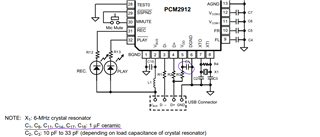Tool/software:
Hello,
I am working on a custom board using the PCM2912 as a USB Audio interface to a PC, based on the TI reference schematic. I am encountering a critical issue that I am unable to resolve despite extensive verification.
When I connect the board to a PC, Windows shows the message:
"USB Device Not Recognized"
Using an oscilloscope to probe the USB lines:
-
D+ shows valid activity at connection (USB burst visible)
-
D− remains stuck at 0 V (no transition)
Please find schematic and PCB layout attached below.
Verifications performed:
-
Power: The chip receives a stable 3.3 V between VDD and DGND
-
Crystal: 12 MHz clean sine wave observed on XTO (pin 7)
-
D− connection: 20 Ω between USB P3.2 and U1.3 through R2 (22 Ω)
-
No short to GND: 200 kΩ between D− and GND
-
D+ to GND resistance: 12 MΩ
-
Assembly: Machine-soldered, visually inspected
-
Tested on multiple USB cables and host PCs
We are using the PCM2912, which is now marked as “not recommended for new designs”, replaced by the PCM2912A.
I verified that the series resistors R2/R3 (22 Ω) are correctly placed as recommended in the datasheet.
No other USB device is detected by the host.
Has anyone experienced a similar case where D− is inactive, despite valid D+, clock, and power?
I would really appreciate any insights, suggestions, or confirmation if this behavior may have been observed with specific PCM2912 lots.
Thank you in advance! 


